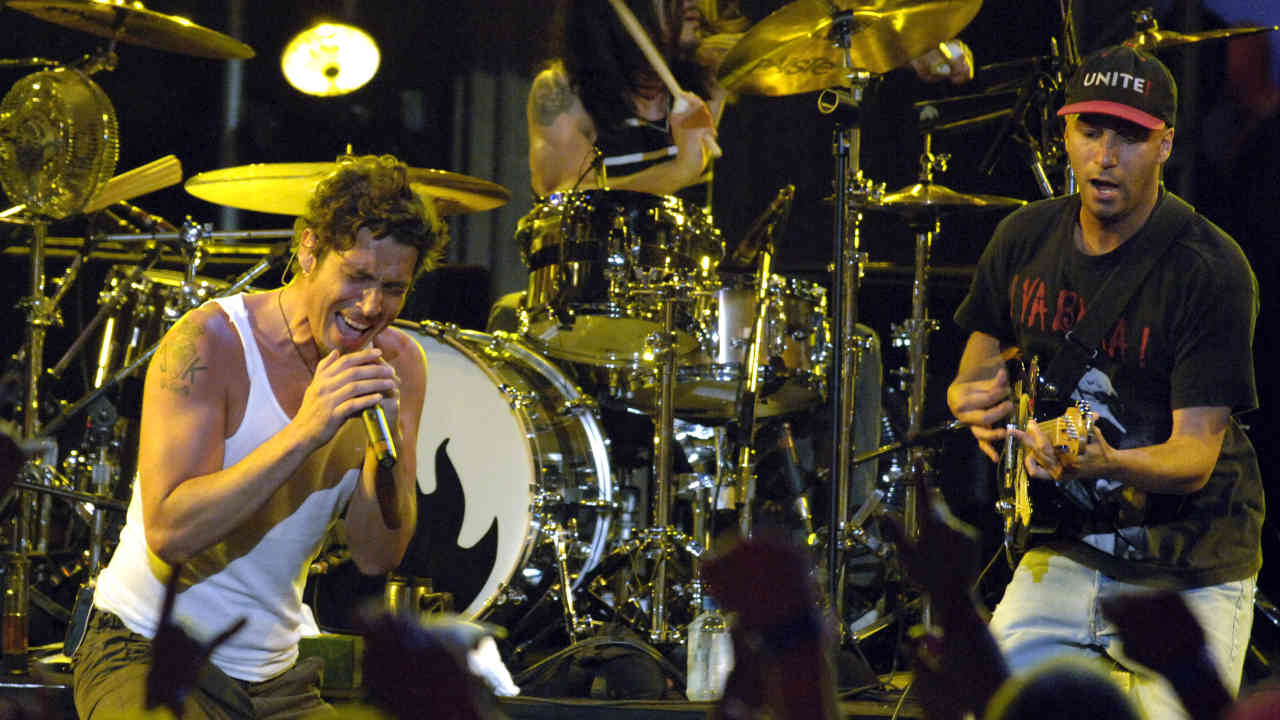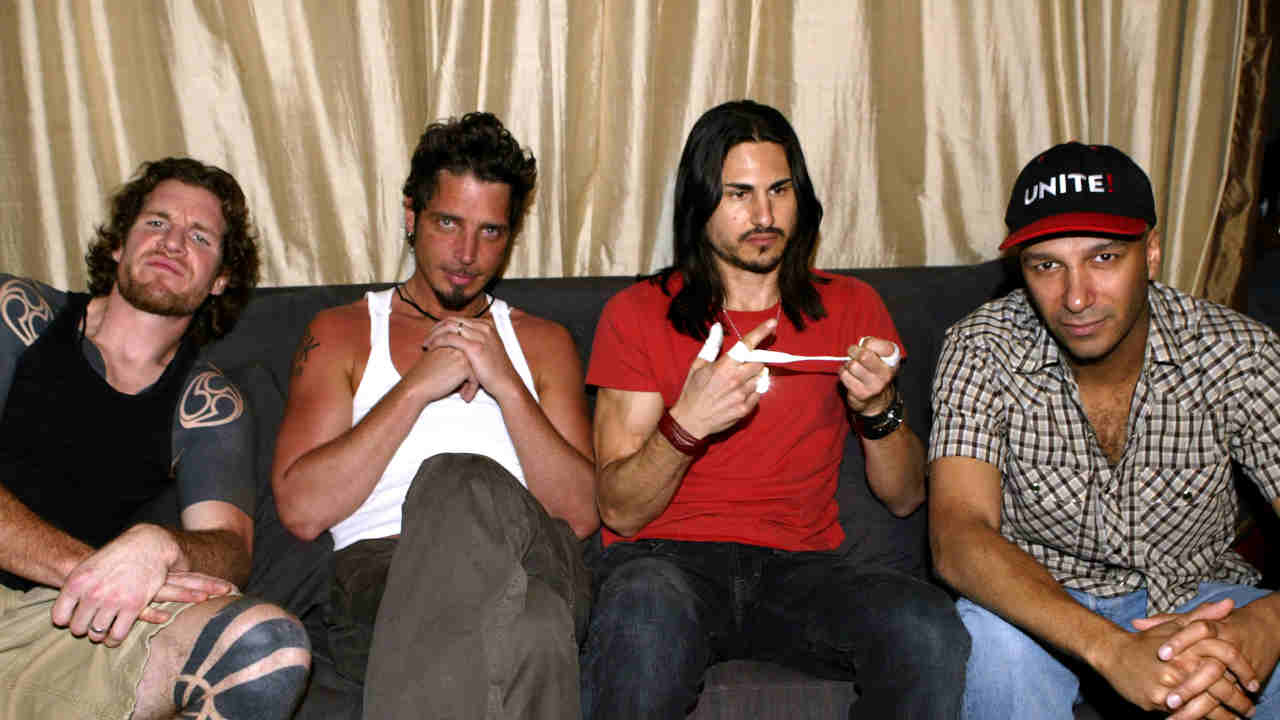Featuring members of Rage Against The Machine and Soundgarden, Audioslave were the ultimate 2000s supergroup. Between 2002 and 2006, they released three albums that mixed classic rock dynamics with an alt-rock edge. In 2006, as they released their third and final album Revelations, guitarist Tom Morello and singer Chris Cornell told Classic Rock why their union felt like a breath of fresh air after their previous bands – and why RATM-style politics had no place in Audioslave.
Tom Morello scans the room service menu of London’s Metropolitan Hotel and settles on scrambled eggs. He conveys this choice to his press officer, snaps the menu shut, then playfully pats the cushion of the window seat – an invitation for me to share the view over Hyde Park.
As ever, the Audioslave guitarist is a great advert for the rejuvenating qualities of rock’n’roll. Close-shaven and bright-eyed, his wiry frame barely filling the orange T-shirt onto which someone has scrawled ‘Morello’ in black marker pen, you’d never guess he’d been fielding interviews since the early hours of this morning.
The official line is that we’re here to talk about Revelations. Certainly Audioslave’s third album deserves to be discussed. As we discovered via a private playback for the media (Epic Records deems the album to be too important to risk sending out individual copies), it’s a fantastic departure for the band, with funk influences now discernible among the more familiar thunderous riffs, and vocalist Chris Cornell striking the right balance of power and soul.
Less officially, we’re here to set a few things straight. It’s been almost six years since Morello and the Rage Against The Machine rhythm section of bassist Tim Commerford and drummer Brad Wilk joined forces with former Soundgarden vocalist Cornell. And yet, to this day, not an interview goes by without some barbed reference to Audioslave as a ‘supergroup’. Some critics argue that Audioslave still feels like a marriage of convenience; others that the interpersonal bonhomie makes for slightly toothless music.
Five minutes in Morello’s company is enough to make you forget there was ever life before Audioslave. Quite patently, the guitarist has invested everything in this band, and believes it is only media pundits who still use the ‘S’ word to describe them. “It’s always been clear to us this isn’t just a supergroup,” he smiles. “And now we’re on our third record, the rest of the world knows too. Besides, if Audioslave is anything, it’s a super-duper group.”

Morello has described Revelations as “Led Zeppelin meets Earth, Wind & Fire”. Would he care to elaborate?
“I’m the hard rock policeman of the band,” Morello reasons. “And the record first and foremost has to kick ass. Once it does, then what makes music interesting is for it to groove as well. That’s what this record does. It’s a face-ripping record that you can shake your ass to. And I don’t think Chris has ever sung better. There’s less hollering; he’s really got in touch with the blue-eyed soul singer within.
“You’d have to ask Chris about lyrics,” he continues, “but Wide Awake [about the fallout of Hurricane Katrina] is certainly the most explicitly political Audioslave song we’ve done. Everyone saw how George Bush failed the American people, and I’m glad Chris wrote about it.”
Which is interesting, if it is true that a condition of Cornell joining Audioslave was that it would be apolitical.
“Well, that’s inaccurate,” Morello counters. “Initially it was my hope that Audioslave would be more political than Rage, but it turned out that wasn’t going to be authentic. Audioslave was allowed to find its own path, while I formed [political organisation] Axis Of Justice with Serj Tankian from System Of A Down, and started [side-project] The Nightwatchman, writing political folk music in the style of Woody Guthrie. It’s an important part of my musical life. It fills a need for me.”
Some people hold the view that Morello is the brains behind Audioslave and Cornell is the voicebox.
“I certainly wouldn’t characterise Chris like that,” the guitarist responds. “The two things I think are extraordinary about him are, first, his ability to create melodies over any piece of music. That’s one of the greatest strengths of Audioslave. It can be a simple three chords or a more complicated riff, and he can do the great Cornellian vocal treatment and never repeat himself. The other thing is that he tends to love what we come up with musically. And that’s in stark contrast to Rage. Frankly, I don’t think there was a single riff I wrote after 1992 that Zack [De La Rocha, RATM vocalist] even liked.
“And no, I don’t agree that bands benefit from friction,” he fires, without the question being asked. “Certainly not with any bands I’ve been in. Maybe in Rage there was a musical tension where the hard rock and hip-hop clashed, and the rap and crazy guitar butted up against each other, but those things were positive. The personal disagreements were always negative. When Rage was great as a songwriting unit, it was when we were the best of chums. The periods of four years between records, the wasted time and cancelled tours, that was during the conflict. Obviously there’s a lot less conflict in Audioslave,” he says. “When we write songs, it’s all four of us in the room, bouncing off each other. I would consider them great friends. It’s not like we’re down at the pub all the time, but we like each other very much.”
Two weeks later Classic Rock hooks up with Chris Cornell in LA to get his take on things. We tell him about Morello’s ‘blue-eyed soul singer’ description. “The bald guy said that?” he chuckles. “Well, maybe it comes with age. We’ve steered into a more funk rock or soul rock area on Revelations, which I like. If I pull the band in any direction, maybe I’m trying to pull it out of a straightforward ‘been there, done that’ rock direction. I think you should go where your expression takes you and not worry if it’s hard rock or samba or polka. Okay, maybe worry a little bit if it’s polka.”
We know about the voicebox, of course. What else does Cornell bring to Audioslave?
“I write all the lyrics,” he says. “And the mood of a song will always steer towards the person writing the words. Sometimes that’s a difficult thing. Of course, the fact that you’re singing your words makes it much easier. But the fact that your words also tend to represent the attitude of the band can make it a little difficult. I don’t want to write lyrics that I couldn’t imagine Timmy or Brad or Tom standing behind on stage. So it goes into some personal territory, for sure, but it’s also social anxiety or family issues – things we’re all going through.”
Surely there must be at least some pressure on Cornell to write about politics, given Morello’s political activism?
“No. I don’t think about that,” Cornell replies. “It wasn’t part of the deal. It would make for pretty bad lyrics. And personally, my theory is that if you want to get involved in politics you jump into the political world, you don’t join a rock band.
“I think a four-minute song as a medium for expressing political beliefs is kinda retarded,” the singer continues. “First of all, your audience isn’t going to learn anything from you; it’s just a bunch of people patting each other on the back because they agree with each other. And in my opinion it’s not entertainment either. I’ve always been immersed in music from more of an escapist standpoint, where I want to go into other worlds and use it as a way to avoid day-to-day reality.”
So it doesn’t bother you that Tom can’t express himself fully through Audioslave?
“No. His political life and activism is Axis Of Justice. And that’s the way it should be. He’s been able to achieve much more in that world with Axis Of Justice, and there’s a clear separation between the band and everyone else’s passions that they’re into. It makes it less confusing and puts us in a position as a band to support him; we donate money from each ticket.”
It’s hard to fault Cornell’s logic. Audioslave is neither Rage Against The Machine, nor Soundgarden, nor an ideological mash-up of the former’s politics and the latter’s angst. It’s a band in its own right, with its own dynamics and agenda. And a fantastic third album that might just force the naysayers to accept all of this. As Cornell says, it’s only rock’n’roll. But when it’s this good, that’s enough.
Originally published in Classic Rock issue 98

